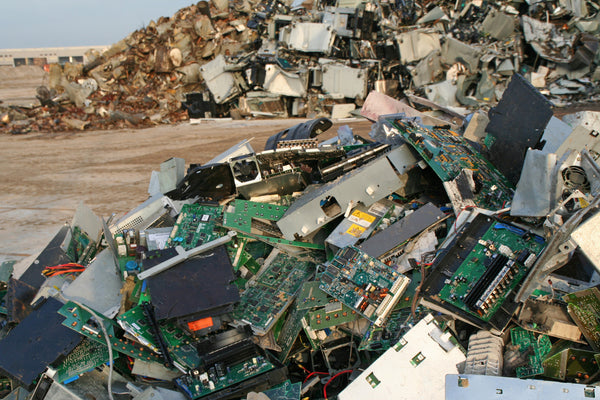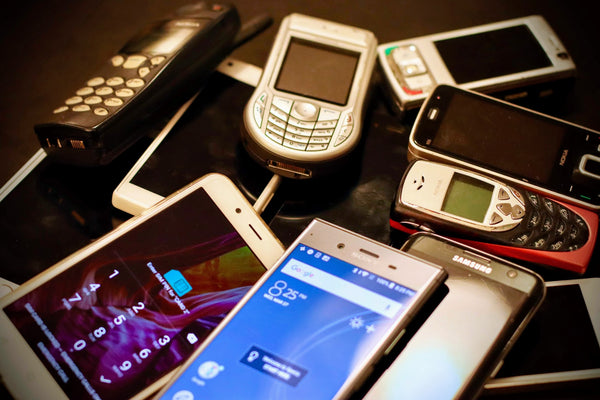The Global E-Waste Crisis: What It Is And Why We Need to Act
There’s no denying the rate with which technology is advancing. Our phones hold more music than some years managed to produce. There are smart versions of everything - from TVs and water bottles to doorbells and thermostats. Virtual reality can let us walk on the moon from the safety of our homes. It’s a thrill-seeker's ride. We can do amazing things.
However, it all comes at a cost beyond a device’s price tag. If we aren’t careful, the way we handle tech could lead to the global e-waste crisis escalating to a point where resources become truly finite.
You may have noticed, Gotraka is excited about tech. But we’re also dedicated to operating in a sustainable way. We want to ensure the cost to our environment remains as low as possible. Grouped deliveries, plastic-free packaging, a zero-waste-to-landfill plan and a vision for repurposing old or unwanted tech are just a few of the ways we’re aiming to tackle the e-waste crisis. Together with responsible manufacturers and savvy consumers, we believe the state of the global e-waste crisis can dramatically improve.
What Is The Global E-Waste Crisis?
If you consider the kind of things we routinely throw into rubbish bins, you’d be forgiven for imagining that landfills are mostly made up of foil lids, nappies, coffee pods, and unusable debris. It may come as a surprise to learn that e-waste has become the world’s fastest-growing domestic waste stream (according to the United Nations University).
How Much?
Worldwide, 53.6 million metric tons of global e-waste was generated — in 2019 alone. This came before an unprecedented shift towards working from home that further increased the reliance on and demand for technology in subsequent years.
Along with this surge of demand, constant pressure to have the newest tech, and the perceived lack of reuse and recycling facilities are among the main contributors to the global e-waste crisis.
Demand for the Newest Tech

If you’ve ever been online or in store to purchase a new tablet, phone or laptop, you’ll have likely been pressured (subtly or not so subtly) into purchasing the latest model. Annual hardware updates, expensive marketing campaigns, and the threat of support being pulled from older models, all work towards creating a cycle of constant manufacture.
This is problematic. Typically, manufacture accounts for the largest portion of a device’s carbon footprint by a significant margin. Mining for precious metals, working with potentially dangerous substances, and cutting components to fit particular shapes all have an adverse effect on our environment.
Who knew that cutting a motherboard into shape could have a negative effect on the environment? By creating a smaller motherboard that doesn’t require precise cutting to fit into a device, pollution could be significantly reduced. Unfortunately, the constant demand for new tech makes it almost impossible to introduce this kind of sustainable, homogenised component.
The 2020 Tech-Surge

Dare we recall the pandemic lockdowns? In 2020, working from home changed from an occasional oddity to an absolute necessity for a huge number of people. Office workers, students, teachers, and even households that were previously averse to tech, started contributing to its increased demand.
And those households with little interest in the world of tech would understandably turn towards well-known retailers (pushing its latest models), rather than smaller legitimate sellers (offering refurbished options).
Do You Know How To Recycle Your Old Devices?
The increased demand for tech has understandably increased the strain on organisations responsible for its recycling, reuse, and redistribution. However, it’s actually a lack of awareness of groups like ReadyTechGo that’s become one of the major factors in the UK e-waste crisis. A huge number of people in the UK simply aren’t sure what to do with their unused electronic devices. This has led to the UK becoming one of the largest e-waste producers in the world.
Hope is far from lost, however. An increasing number of organisations are starting to take the e-waste crisis seriously. The right to repair movement is gaining traction, and companies like Mer-IT have been focused on donating necessary equipment to families in need since the Covid-19 pandemic started in 2020.
Creating A Circular Economy
Those interested in the tech world may have heard of the term circular economy — the idea that each device can circulate through the market rather than being disposed of wastefully after a single use. By aiming for this kind of economy, we can drastically cut down on the damage caused by constantly manufacturing new devices.
The extra connectivity afforded by our more digitally-minded world certainly has its upsides, and the UN believes it will make it easier to achieve their Sustainable Development Goals (SDGs). There are reasons to be hopeful, but we need to act if we’re going to turn the tide on this quickly worsening e-waste crisis.
Why We Need To Act Now

There are no signs that the global e-waste crisis will improve or even plateau unless we make some changes. Many countries have plans to become carbon net-zero — meaning their carbon emissions are completely offset by carbon dioxide removal or by eliminating the emissions in the first place. Most of the UK has planned to achieve carbon net-zero by 2050 (2045 for Scotland). Without tackling the UK e-waste crisis, meeting this goal is going to be extremely challenging.
Harmful Substances
By allowing electronic waste to end up in landfill, not only is our environment being negatively impacted, but public health is also being threatened. Due to the chemicals and materials used to build modern devices, e-waste can cause harmful substances like mercury to seep into the soil, potentially reaching nearby bodies of water.
Drinking water affected by mercury can lead to kidney failure in humans, whilst having large quantities of it in the soil can kill crops and damage people’s health simply by being nearby (we’re talking bioaccumulation).
Valuable Minerals To Harvest
As well as the harmful substances that litter landfills, e-waste tends to contain valuable minerals such as 22-24 carat gold (higher carats are better conductors). While the amount of gold in any one device is quite low, the World Economic Forum places the worth of global e-waste at about $62.5 billion annually.
These devices maintain far more value by being repaired and reused. In fact, harvesting and repurposing these valuable minerals causes significantly less carbon emissions than mining for more.
How Many Old Tech Items Are Still In Your House?

Throwing away electronic devices isn’t the only factor adding to this waste of resources. According to a study by OKdo, hoarding is a major issue in the UK. As many as 60 old and unused tech items are stashed away in drawers and cupboards across the country. Along with decluttering our homes, adding these items to the circular economy of reuse and recycling would reduce the need for mining and manufacture — two of the biggest carbon emission producers.
But, how should you get rid of unused electronic items? And what can you do to reduce e-waste in the UK?
How You Can Help
1. Can It Wait?
It can be surprisingly easy to be a part of the solution to the e-waste crisis in the UK (and get that warm feeling inside). Helping the fight against e-waste can be as simple as…keeping your devices for longer. Playing the waiting game. By bowing out of the annual demand for the latest device, we can lower the need for supply. Ignore those upgrade emails and marketing ploys. Ask yourself, can I wait?
2. Don’t Put It In Your Drawer
When the time does come for you to replace your device, consider donating it to someone else rather than your drawer. If you don’t think you know anyone who can make use of your old electronics, there are a number of organisations in the UK that can refurbish and re-home them. MerIT and ReadyTechGo are just two great examples of groups dedicated to ensuring tech is available to those in need throughout the UK.
3. Refurbished Options
Purchasing a refurbished device is a great choice for a number of reasons beyond helping the e-waste crisis in the UK. You can make significant savings (especially when compared to buying new), and there’s a good chance your device’s specifications are known so it can be repaired without needing to be shipped back and forth from a supplier (which is not always the case).
If you choose to buy a new device, it’s worth looking out for the EPEAT or Energy Star certification. This ensures that it has at least passed certain sustainability standards in how it was manufactured.
4. Buy Once, Buy Right
Finding a device that suits your needs without contributing to the e-waste crisis, can be a stressful proposition. By providing advice backed by years of experience in the industry, Gotraka aims to ensure that you get exactly what you need without the need to exchange and find something more suitable. Not only does this eliminate the need for redelivery and repackaging, but it’s a far more pleasant experience for everyone involved!
Gotraka’s Response To The E-Waste Crisis
Gotraka is dedicated to both sustainability and customer satisfaction. We’re throwing all we’ve got into playing our part in the fight against the e-waste crisis in the UK.
We’re aiming to tackle the demand-for-new-tech problem by communicating clearly with our customers to figure out exactly what they need. With the benefit of many years in the tech industry, our customer support operatives will help you to find the best computer, printer, or device for you — not just the newest available model. And why replace your favourite electronics every year?
And though we’re a few years past 2020 now, there are still more people than ever before working remotely. At Gotraka, we’re confident that we can supply tech that meets the needs of these workers, while still keeping an eye on our environmental impact. Along with reducing the need for redelivery by ensuring customer satisfaction before checkout, grouped deliveries, collection points, and carbon neutral deliveries will help us offset the impact of this heightened demand.
You can read more about Gotraka’s e-waste solutions and dedication to sustainability by clicking the link below.







